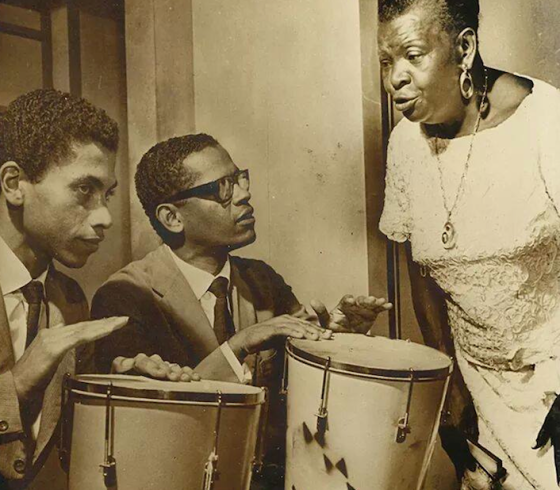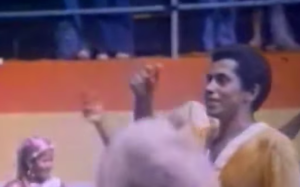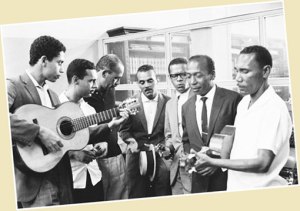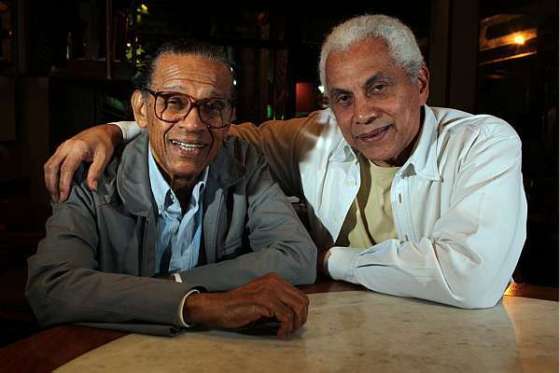Lyrics from "Sem Ilusão" by Elton Medeiros and Antonio Valente (1977)
No carnaval não vou querer me fantasiar// This Carnival, I don't want to put on a costume
Não vou querer me vestir de rei// I don't want to dress up as a king
Não quero mais colorir a dor// I no longer wish to gloss over the pain
E se alguém quiser me aplaudir// And if anyone wants to applaud me
Vai ter que ser assim como eu sou// It's gonna have to be for me, as I am
Não quer dizer que não vou nem brincar// I don't mean to say that I'm not going to revel
Só não quero é enganar o meu coração// I just don't want to fool my heart
No Carnaval, não vou mais sair fingindo//During Carnival, I'll no longer go out pretending
Que passo a minha vida inteira a cantar// That I spend my whole life singing
Eu vou me divertir, na certa eu vou sambar// I'll have fun, sure, I'll samba, no doubt
Mas dessa vez a ilusão não vai me pegar// But this time, illusion won't get the best of me
No Carnaval eu sempre sai sorrindo// During Carnival, I've always gone out smiling
Me divertindo só pra desabafar// Having fun just to lighten my heart
Três dias pra sorrir, um ano pra chorar// Three days to smile, a year to cry
Mas dessa vez a ilusão não vai me pegar// But this time, illusion won't get the best of me
Não vou querer me vestir de rei// I don't want to dress up as a king
Não quero mais colorir a dor// I no longer wish to gloss over the pain
E se alguém quiser me aplaudir// And if anyone wants to applaud me
Vai ter que ser assim como eu sou// It's gonna have to be for me, as I am
Não quer dizer que não vou nem brincar// I don't mean to say that I'm not going to revel
Só não quero é enganar o meu coração// I just don't want to fool my heart
No Carnaval, não vou mais sair fingindo//During Carnival, I'll no longer go out pretending
Que passo a minha vida inteira a cantar// That I spend my whole life singing
Eu vou me divertir, na certa eu vou sambar// I'll have fun, sure, I'll samba, no doubt
Mas dessa vez a ilusão não vai me pegar// But this time, illusion won't get the best of me
No Carnaval eu sempre sai sorrindo// During Carnival, I've always gone out smiling
Me divertindo só pra desabafar// Having fun just to lighten my heart
Três dias pra sorrir, um ano pra chorar// Three days to smile, a year to cry
Mas dessa vez a ilusão não vai me pegar// But this time, illusion won't get the best of me
-- Interpretation --

1966:
Paulinho da Viola and Elton Medeiros practice with Clementina de Jesus
for their show in Dakar, Senegal, at the first World Festival of Black
Arts. Paulinho recalls he and Elton only played atabaque - no guitar or
cavaquinho - and that the show was a huge success.

Elton Medeiros on the matchbox and Paulinho da Viola on the guitar, cover of their 1968 album Samba na Madrugada
Elton
Medeiros (born 22 July 1930, Glória, Rio de Janeiro) has never been
keen on playing the role people expect of him. He's been known since the
1960s as a master of rhythm on the matchbox, for instance, but never
liked posing with the diminutive instrument, saying those kinds of
pictures and the like contributed to the "folklorization" of samba:
"A lot of people think that to make samba you have to be a bar fly. I
know how to beat a rhythm on a matchbox, but I don't play up that role
just to live up to what people expect of a sambista." This song takes a
similarly rebellious tone: Why do I have to pretend I have no cares in
the world, and fool even myself, just because it's Carnival? And it came
at a time when a lot of sambistas were particularly down on Carnival,
as Elton hints at in the introduction to the song on the 1977 album Os Quatro Grandes do Samba.
On the album, Guilherme de Brito asks Elton
Medeiros why he, who had founded three samba schools, wasn't parading
with any. Medeiros responds, "It's true, Guilherme, lately I've really
lamented what's been happening with Carnival."
The
three samba schools he founded were: GRES Tupi de Brás de Pina
[late 1940s], GRES Unidos de Lucas [1967] and GRANES Quilombo [1976],
which was founded essentially out of protest of the direction samba
schools had taken. In 1977, Elton indeed marched -- or maybe danced is
more appropriate -- in Quilombo's first Carnival parade.
The
sentiment expressed in this song reflects the widespread feeling of
dejection that had taken hold among most "old-guard" samba composers by
the mid to late 1970s: Most sambistas in Rio thought leadership at samba
schools had become too autocratic and profit-driven, contributing to
the commoditization of samba by seeking only sambas that would sell
well. And any profits stayed in the pockets of outsiders who had taken
power at the schools, or was used to pay for expensive artists to
produce ever more extravagant Carnival floats and costumes.

Paulinho da Viola in the first Quilombo Carnival parade. I wasn't able to find images of Elton Medeiros in the parade.
In
protest -- particularly of the situation at Portela -- in 1975-1976,
together with Candeia and Wilson Moreira (both Portela), and Nei Lopes
(Salgueiro) -- Elton Madeiros founded Grêmio Recreativo de Arte Negra e Samba Quilombo. Candeia had come up with the idea for the new samba school after growing totally fed up with Portela, as this post explains.
Elton Medeiros was never a member of Rio's biggest schools like Portela and Mangueira; in the 1970s he was a composer with GRES Unidos de Lucas.
But Elton felt close to Portela because the school had chosen him and
his line of composers at Unidos de Lucas to be their "patrons." Medeiros
also worked closely with several of Portela's most revered composers,
including Zé Kéti, Paulinho da Viola, and Candeia, along with Mangueirenses like Cartola -- with whom he composed one of the best-loved samba classics of all time (and one of the first entries on this blog), "O Sol Nascerá (A Sorrir)," Nelson Cavaquinho, and Nelson Sargento.

Conjunto
Voz do Morro was one of the groups formed at Zicartola, in an effort to
give more publicity to the greatest talents in samba do morro. L-R:
Paulinho da Viola; Anescarzinho do Salgueiro; (???); Zé Cruz do Chapéu
de Palha; Elton Medeiros; Zé Keti; Jair do Cavaquinho.
Medeiros was born in the Glória neighborhood of Rio de Janeiro, where he lived until the family moved to Brás de Pina
when he was seven. Just a year later he reportedly began composing
sambas with neighborhood friends, and as a teenager he learned to play
trombone and saxophone at school. When he was about 20 he met Zé Kéti,
and in the early 1960s he became a regular at Zicartola -- the
restaurant Cartola ran with his wife Zica from 1963 - 1965 -- where he
sang and "swapped ideas" (from the Portuguese trocar ideia) with Rio's samba and cultural elite.
Two groups that propelled the Zicartola set to samba stardom were born from the encontros at the restaurant: In 1965, Elton joined Herminio Bello de Carvalho's musical show Rosa de Ouro. Soon after, upon request from the record label MusiDisc, Zé Kéti formed the group Conjunto A Voz do Morro
with performers from Rosa de Ouro: Jair Costa (Jair do Cavaquinho),
Paulinho da Viola, Elton Medeiros, Anescarzinho do Salgueiro, Oscar
Bigode, Zé Cruz - who played percussion on a straw hat, Nelson Sargento (for the second album), and of course, Zé Kéti. Rosa de Ouro recorded two albums ("Rosa de Ouro" and "Rosa de Ouro II"), and Voz do Morro recorded three, "Roda de Samba," "Roda de Samba II," and "Os Sambistas."
In 1968, Elton and Paulinho da Viola recorded the beautiful album "Samba na Madrugada,"
with sambas composed with Cartola, Mauro Duarte, Zé Keti, Hermínio
Bello de Carvalho, and Paulinho and Elton together. 1973, Elton
recorded his first self-titled solo album, with his classics "Pressentimento" (with Herminio Bello de Carvalho), "Mascarada"
(with Zé Kéti), and "O Sol Nascerá (A Sorrir)." Four years later, with
Candeia, Nelson Cavaquinho, and Guilherme de Brito, he recorded the
historic album that included "Sem Ilusão."
(The date is wrong on the YouTube video):
Here is footage of a Rosa de Ouro reunion in 1980, with each sambista contributing to a pot-pourri with a samba he composed:


